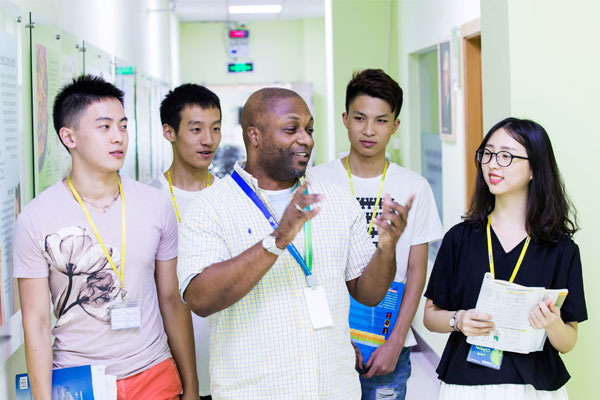US Students Bring Honey Project to Ghana
Some American students from Florida are bringing the business of beekeeping to farmers in a community in Ghana. The program, called the Honey Project, not only gives the students a chance to own and manage a business. It also gives them a chance to help ease poverty in Agogo through beekeeping and the sale of honey.
There are plenty of wild honeybees around Agogo, but there was no established market. A businessman named Nathan Burrell and some of his colleagues came up with the idea during a business trip to Agogo three years ago.
NATHAN BURRELL: "It was the ability to effect change and impact the lives of the people. As an entrepreneur and a business person you normally look at market movement. You look at what will sell and what's the most profitable venture to take on. And trust me, it wouldn't have been honey. But it was the fact that the honey had an opportunity to really change the lives of those people and provide them with a living wage."
Nathan Burrell says many of the farmers in Agogo earn less than a dollar a day. He calls the project an example of social entrepreneurship.
It began with the planting of ten to twelve beehives in the town. Nathan Burrell depended heavily on the beekeeping experience of Dan Warren. He heads an environmental group in Florida called One Village Planet that works in Ghana and Haiti. The Honey Project also partnered with an American company that sells African honey.
NATHAN BURRELL: "All the profits and proceeds that the students earned went back into the reinvestment of the Agogo venture, of really trying to plant more hives. I think there are over one hundred hives now that have been planted in the village."
Members of the group traveled to Agogo this spring to provide more education and training in the beekeeping business. They also brought protective clothes for the beekeepers and equipment to gather and package the honey.
The Honey Project currently sells a limited amount of honey in Ghana and the United States. The project also uses student volunteers in Agogo to gather and sell the honey. Nathan Burrell says it is not a profitable business yet, but the farmers are hopeful. And honey is not the only bee product they could sell.
NATHAN BURRELL: "Everything from the wax to the pollen to the royal jelly could be marketable and can add income and revenue generation to those cooperatives that we're working with."
For now, there are no plans to expand the business beyond Agogo. But the organizers in south Florida are looking to involve students around the United States.
And that's the VOA Special English Development Report, written by June Simms.
一些来自佛罗里达的美国学生将养蜂业务带给迦纳一个社区的农民。该项目成为蜂蜜工程,不仅给学生提供了拥有和管理商业的机会,还给他们带来帮助Agogo农民通过养蜂和销售蜂蜜改善贫穷的机会。
在Agogo地区有充足的野生蜜蜂,但是没有成熟的市场。三年前,一个名叫Nathan Burrell和他的同事到Agogo出差时想到了这个主意。
Nathan Burrell:“这关乎对他们进行改变和影响人们生活的能力。作为企业家和商人,正常情况下,你会观察市场活动。你会观察什么产品能够畅销,那一个是收益最高的企业。相信我,一定不会是蜂蜜。但是,蜂蜜确实有机会改变人们的生活,为他们提供生活成本。”
Nathan Burrell说许多Agogo农民日平均工资在一美元以下。他称蜂蜜工程是社会企业的典范。
该项目最开始在Agogo镇养殖了十到十二个蜂巢。Nathan Burrell完全依靠在Dan Warren的养蜂经验。他在佛罗里达负责一个叫做村庄星球的环保组织,主要在迦纳和海地工作。蜂蜜工程还与一个非洲公司合作,主要负责销售非洲蜂蜜。
Nathan Burrell:“学生赚取的所有利润都对Agogo企业进行再投资,养殖更多的蜂巢。我认为现在在那个村庄里已有100多个蜂巢。”
该环保组织成员今年春季到Agogo为养蜂业提供更多的教育和培训。他们还为养蜂人带来了防护衣和蜂蜜收集和包装设备。
蜂蜜工程目前在迦纳和美国销售的蜂蜜数量有限。该项目还在Agogo招募学生志愿者来采集和出售蜂蜜。Nathan Burrell说,目前该业务还未盈利,但是村民们都充满希望。而且蜂蜜不是养蜂业唯一可以出售的产品。
Nathan Burrell:“所有产品,从蜂蜡到花粉到蜂王浆都可以出售,可以为我们的合作单位增加收入。”
目前为止,还没有计划扩展Agogo地区以外的业务。但是该佛罗里达南部的组织者有意在全美国范围内寻找学生加入。

